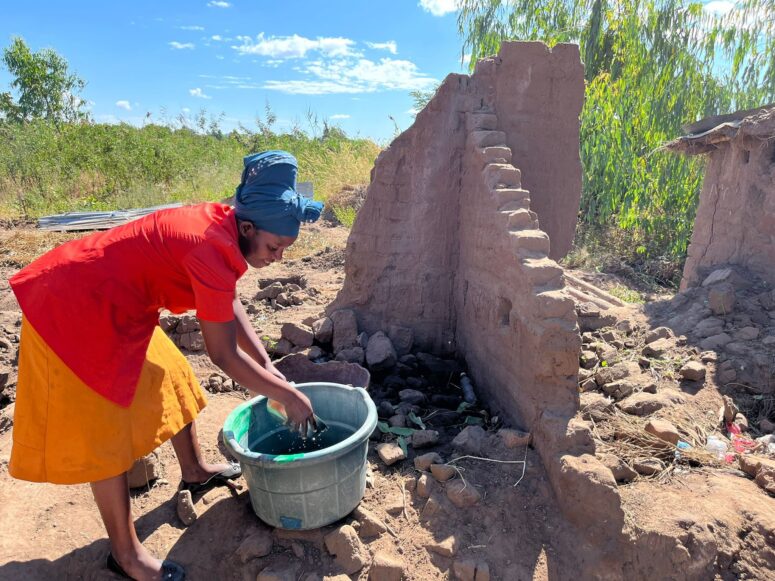With multiple floods, droughts, and cyclones hitting Southern Africa in the last two months, strengthening community resilience to climate shocks comes into sharp focus as increasingly urgent.
As our community partners in Mozambique face Tropical Storm Filipo in March 2024, we reflect on the impact of Cyclone Freddy, just one year ago. When Cyclone Freddy hit in March 2023, Bertha Mawindo’s backyard garden in rural Malawi, as well as the crops at her farm, were destroyed. Her goat house and kitchen suffered significant damage, leaving her living in fear as water repeatedly flooded her home. Despite these major setbacks to her safety, livelihood and food security, Bertha knew from her participation in The Hunger Project’s Vision, Commitment and Action workshop that she needed to create a new action plan that would support her to achieve her vision for the future. Bertha was committed to keeping her family nourished and to rebuilding her home and business.
As she cleared the damage from the storm, Bertha drew on her training in improved water, hygiene and sanitation practices, making use of an upgraded toilet facility and maintaining a clean environment around her home, keeping herself and her children safe from diseases, like cholera, which run rampant after floods. She began making bricks to renovate her kitchen and build a chitetezo mbaula, a permanent and efficient cooking stove, that would allow her to cook with greater convenience and reduced fuel consumption. Beyond her home, Bertha also reconstructed her backyard garden and now proudly nurtures four varieties of local vegetables, significantly enhancing her family’s nutrition.
Vision, Commitment and Action Builds Resilience
Bertha’s story is just one of the many tales of resilience within her community. Faced with the aftermath of Cyclone Freddy, the people of Phalombe, Malawi rallied together to rebuild their lives and create a brighter future. The impact of the community’s participation in Hunger Project trainings and in particular with the Vision, Commitment and Action methodology had been transformative: this methodology had been ingrained in the community’s approach to rebuilding and it fostered a sense of collective empowerment that transcended individual hardships.
Together, we weather the storms and rise strong, for within us lies the power to rebuild and create a future of hope.
Mwenye, village leader
Fostering Resilient Communities
Today, the people experiencing the climate crisis most severely are also most likely to be living with malnutrition and chronic hunger. Drastic weather changes are impacting crop yields, livelihoods and social stability. While The Hunger Project does not engage in emergency response, our work focuses on promoting strong systems and capacity so communities grow more resilient in order to withstand and manage crises, such as food insecurity due to droughts or flooding.
The Southern Africa Region in particular has been hit left and right, with either drought or cyclones back to back, for the past few years. And yet, in the communities where we work, there is a sense of resilience. The people feel confident in their ability to build back and overcome the challenge.
Rowlands Kaotcha, Chief of Programs
To support resilient leaders like Bertha and communities throughout the region, please invest now. Your contribution will be directed to areas of greatest need.
Photo credit: Bertha in Malawi, 2023 © The Hunger Project

